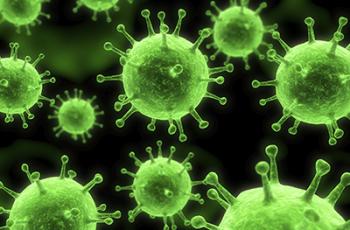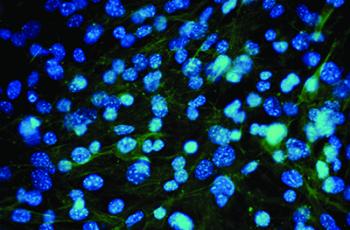Virology
Viral infections are a major cause of human disease. Understanding their biology, mechanisms of pathogenesis, epidemiology, and interactions with the immune system are critical to the development of vaccines and antivirals to treat viral diseases. Moreover, the field of virology has provided tremendous insight into cell biology, immunology, genetics, cancer biology, and many other fields. CLICK HERE to view our faculty with research programs focused on virology. The specific areas of virology studied by our faculty include:
Viral Pathogenesis, Vaccines, and Antivirals Viruses are best known for the many diseases that they cause. These range from the ubiquitous, yet generally harmless, common cold to the more rare and deadly diseases like Ebola. Our faculty approaches the problem of understanding how viruses cause disease, or fail to cause disease, using cell culture, animal models, and epidemiology to explore contributions of both the host and the virus. We use a variety of methods including focused studies of individual variables and the integrated methodology of systems biology. By understanding how viruses cause disease, our faculty seeks new avenues for treatment and the development of our best weapons against viruses, namely vaccines. Major pathogens under investigation in our labs include HIV and other retroviruses, influenza virus, poxviruses, herpesviruses, West Nile virus, Ebola virus, papillomaviruses, polyomaviruses, and adenovirus, among others.
Viral Oncology Viruses are known to cause ~20% of human cancers, and discovery efforts are underway that may reveal new associations between viruses and cancer. Studies of the oncogenic activities of viruses continue to reveal new insights into cell biology and the biology of cancers of non-viral origins. Major oncogenic viruses that are the focuses of our labs include the herpesviruses, EBV and KSHV; human papillomavirus; human polyomaviruses; hepatitis B virus; and hepatitis C virus.
Viral Evolution Many viruses evolve rapidly, both within a single infected host and within a population of hosts. Other viruses coevolve slowly with their hosts. Viral evolution has a major impact on the emergence of new viral diseases and is an important consideration in treatment strategies and vaccine design. By understanding the evolution of viruses, our labs hope to be able to monitor or predict the emergence of new pathogenic strains of known viruses and to design vaccine and treatment strategies.
Molecular and Structural Virology To understand how viruses replicate and cause disease, we must elucidate their structures and the biochemistry of their proteins. In addition, the unique properties of some viral enzymes have made them invaluable tools for molecular biology. Our labs use cutting edge biophysical and biochemical techniques to determine what makes viruses tick.
Bacteriology
The extraordinary range of processes influenced by Bacteria and Archaea extends from systems as large and complex as our climate and health to things as small as the smell of some of our favorite cheeses. CLICK HERE to view our faculty who study these fascinating microscopic organisms. Aspects of bacteriology represented by our faculty include:
Bacterial Physiology A common misconception is that bacteria are primitive life forms relative to eukaryotic species. In reality, bacteria are highly evolved organisms that sense and respond to a surprising number of diverse stimuli. Our researchers are investigating processes ranging from the sources and consequences of mutation to the mechanisms by which bacteria translate signals into actions and communicate with each other. The closer we look at these fascinating microbes, the clearer it is that their complexity is truly underappreciated.
Bacterial Pathogenesis Our department has a rich and storied history in bacterial pathogenesis research dating back to some of the earliest studies of virulence conferred by plasmids and the first demonstration of DNA transfer from bacteria to plants. Today our researchers continue to make major contributions in this area – investigating the complex molecular interactions of important pathogens such as Salmonella, Staphylococcus, Yersinia, Listeria, Pseudomonas, Acinetobacter, Escherichia, Helicobacter, Burkholderia, and mycobacteria with their hosts. These bacteria are among the most important global causes of morbidity and mortality in the world today.
Bacterial Evolution With an estimated 1030 bacteria on Earth, and division times of these organisms sometimes as rapid as just 20 minutes, there is an incredible amount of bacterial evolution taking place at any given time. The implications of bacterial evolution are many. Examples include our understanding of the origins of multicellular life and the recent rise of antibiotic resistance. Our faculty who specialize in this area are interested in understanding the molecular mechanisms by which bacteria adapt and evolve, and the implications of bacterial evolution for infectious diseases and bacterial ecology.
Microbial Ecology New imaging and genomic technologies are allowing us to gain unprecedented insights into how Bacteria and Archaea populate and interact with the living and non-living components of their environments. Our researchers are learning about the behaviors and dynamics of bacterial communities and the metabolic consequences of growth in different environmental niches.

